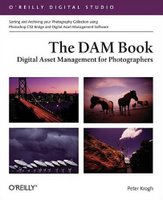 Peter Krogh is the author of The DAM Book: Digital Asset Management for Photographers
Peter Krogh is the author of The DAM Book: Digital Asset Management for PhotographersLibrarian by day, photographer by night
I have a degree in Library and Information Science, and have worked as a Librarian for the last 10 years. I was once introduced with the tag line, "Librarian by day, photographer by night." I spent the first half of 2006 refining my rather meticulous workflow based on The DAM Book, which I found to be well grounded in sound information management principles. After a lot of testing and experimentation, a slightly modified version of the Adobe Bridge and iView workflow in the book works quite well for me.
Read the book, then watch the videos
If you're an experienced Adobe Bridge and iView user, The DAM Book Workflow videos might be helpful on their own. Regardless of your DAM skills, reading the book first will be helpful, and also serve as a handy reference tool when watching the videos. The videos come in a DVD box and consist of two CDs in QuickTime format. Both CDs go through an entire workflow starting with setting up your Bridge and iView preferences. Peter then walks you through his workflow—from downloading the images all the way to the preparing for client delivery, web upload, and printing.
The first workflow is for images shot under variable light, and the second workflow offers tips for studio images shot under controlled light. Each major workflow component is a separate video, which makes the videos load quickly and provides a nice pace for learning.
Both sets of workflow videos are a little over 2 hours long. There is some duplication between the topics covered on the two discs—I found it best to watch the entire first disc, and then skip around in the second one. Workflow one includes an excellent 20 minute long video devoted to Adobe Camera RAW, and a 15 minute video on DNG conversion. The first workflow concentrates on reviewing and rating images in Bridge, and the second workflow covers multiple ways to review and rate images in iView.
DAM Tips and Tricks
The pace of the videos is relaxed and the tone is casual. During the first viewing, I fotnd myself pausing the videos quite often to take notes or tweak a setting here or there. Over the next few weeks I made some adjustments to smooth out my workflow. A few weeks later I picked up a few new techniques by watching the videos again. Here's a good example of a time-saving technique I now use all the time: before watching the videos I would use the Find command in iView to create groups of images according to their star ratings. I learned in the video that I could simply make the star ratings visible in iView's Catalog Fields panel, and now accomplish this task with one or two clicks.
Another great tip I picked up is how Peter sets up folders and program file aliases in the Finder Favorites panel on the Mac. This little adjustment has allowed me to stay more organized when moving files through the workflow, and I can open files in Bridge or iView much more quickly by just dragging and dropping. These nuanced workflow improvements offer everyday time savings that really add up.
Conclusion
If you are using or considering a Bridge to iView workflow, these videos offer an excellent system for managing your images, and time saving tips and shortcuts that make it well worth the $100 price tag. You can see sample videos on http://www.damuseful.com.
If you're not using iView as your cataloging program, I still highly recommend reading The DAM Book. Before making any important decisions about cataloging software, visit the forums over at http://www.thedambook.com for a balanced, long term view of how iView stacks up against some of the new contenders in workflow software like Aperture and Lightroom.
Posted by: JOE REIFER
No comments:
Post a Comment